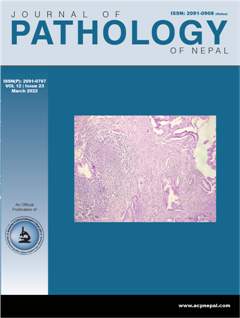Usefulness of prostate specific antigen density in detecting prostate carcinoma: A hospital-based study in patients with prostate biopsies
DOI:
https://doi.org/10.3126/jpn.v12i1.41841Keywords:
Cancer; Prostate; Prostate-specific antigen; Prostate-specific antigen densityAbstract
Background: Prostate-specific antigen density has been suggested to enhance the diagnostic efficacy of serum prostate-specific antigen alone in detecting prostate cancer, thereby reducing unnecessary biopsies and associated morbidities. This study aimed to assess the diagnostic performance of prostate-specific antigen density in detecting prostate cancer.
Materials and methods: A retrospective analysis of histologically proven benign and malignant prostate diseases, submitted in the histopathology department was performed from April 2019 to March 2020. The diagnostic performance of prostate-specific antigen density was assessed and its optimum cut-off value was determined using the receiver operating characteristic curves. The diagnostic efficacy of prostate-specific antigen density was also compared with prostate-specific antigen in detecting prostate cancer.
Results: The AUC to predict prostate cancer was 0.89 (95% CI 0.79-0.98. p <0.001) for prostate-specific antigen density. The diagnostic performance of prostate-specific antigen density at cut-off 0.18 ng/ml/cc was better than prostate-specific antigen alone (AUC, 0.838 vs 0.662). Sensitivity was 80% for both prostate-specific antigen density at cut-off 0.18 ng/ml/cc and prostate-specific antigen. But, prostate-specific antigen density had a higher specificity of 87.7 % than prostate-specific antigen (52.3%)and thus it could better distinguish benign diseases from prostate cancer. It would have reduced unnecessary biopsy by 35%.
Conclusions: The diagnostic efficacy of prostate-specific antigen density was good and it was found to be a better predictor of prostate cancer at the cut-off value of 0.18ng/ml/cc when compared to prostate-specific antigen alone.
Downloads
Downloads
Published
How to Cite
Issue
Section
License
Copyright (c) 2022 reshmi shrestha

This work is licensed under a Creative Commons Attribution 4.0 International License.
This license enables reusers to distribute, remix, adapt, and build upon the material in any medium or format, so long as attribution is given to the creator. The license allows for commercial use.




